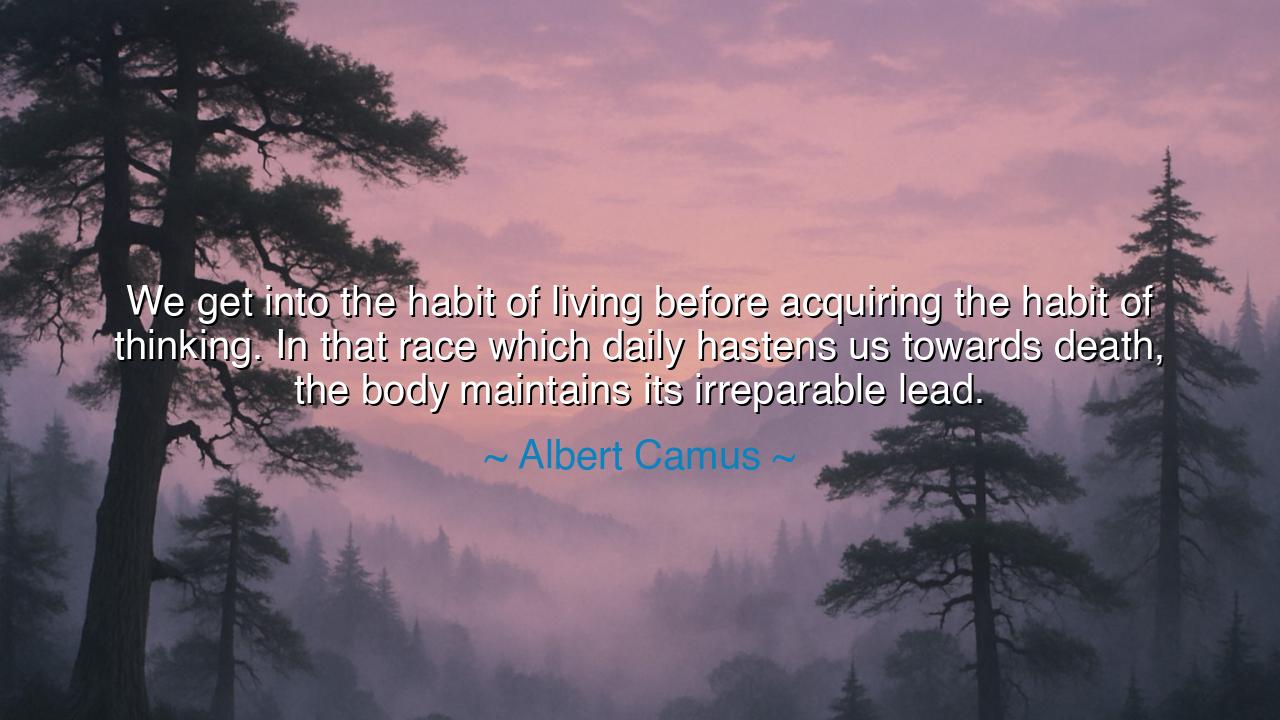
We get into the habit of living before acquiring the habit of
We get into the habit of living before acquiring the habit of thinking. In that race which daily hastens us towards death, the body maintains its irreparable lead.






“We get into the habit of living before acquiring the habit of thinking. In that race which daily hastens us towards death, the body maintains its irreparable lead.” Thus spoke Albert Camus, the philosopher of the Absurd, whose words pierce the illusion of modern life like lightning across a night sky. In this haunting reflection, he reminds us that humanity is born rushing forward—acting, consuming, striving—long before it learns to question why. We live first and think later, if ever at all. The body, driven by instinct and motion, races ahead, while the mind, the slower and more deliberate vessel, trails behind, struggling to make sense of the journey. And so, Camus warns, by the time we begin to truly think, our lives are already half spent, and death—silent, inevitable—has nearly caught us.
Camus, born in the light of Algeria and tempered by the darkness of war, knew well the strange dance between life and reflection. He saw in the modern world a people intoxicated by habit—awake but unawake, alive but not aware. From the first breath, the child is swept into the current of motion: learn, work, love, age, die. All this happens before the soul has time to ask what it means to live, or whether life itself holds meaning at all. The habit of living becomes a rhythm so familiar that to pause, to think, feels almost unnatural. Yet in that unthinking motion, something sacred is lost—the capacity to see life not merely as existence, but as wonder.
The ancients would have understood Camus’s lament. The Stoics, those serene philosophers of old, taught that unexamined life is bondage, that to live well is to live consciously, in harmony with nature and reason. Socrates, at his trial, declared, “The unexamined life is not worth living.” His was a cry against the inertia of habit, against the sleep of the soul. Camus, centuries later, would echo that cry, though with a bleaker note: that even when we awaken to the truth, it may already be too late. For the body, he says, “maintains its irreparable lead.” Time moves forward without mercy, dragging our physical selves through the stages of existence, even as the spirit lags behind, yearning for understanding.
Consider the story of Prince Siddhartha, who became the Buddha. Surrounded by luxury, he lived without questioning—until the day he beheld sickness, old age, and death. In that moment, he awakened to the truth that all life rushes toward decay. But rather than despair, he turned inward, seeking the stillness beyond motion, the peace that comes from understanding. His journey was an answer to Camus’s paradox: to bridge the gulf between living and thinking, between movement and meaning. He withdrew from the race not to abandon life, but to truly know it.
Yet Camus’s insight is not a call to retreat from life; it is a summons to engage with it more deeply. He does not tell us to stop running, but to awaken as we run—to live with eyes open to both the beauty and futility of existence. The race toward death cannot be halted, but it can be understood. In the awareness of our mortality lies our power: to love more fiercely, to act more freely, to cherish the fleeting moments before the finish line. When we recognize that our bodies will always outrun our minds, we learn to live not in illusion, but in presence.
The modern age, consumed by speed and distraction, suffers from what Camus foresaw: an abundance of motion, but a poverty of meaning. We scroll, we labor, we strive endlessly, yet rarely do we stop to think why. The habit of living has become the god of this era, worshiped through busyness and routine. And so the mind withers beneath the weight of unexamined days. Camus reminds us that this is the true tragedy—not death itself, but living without reflection, dying without ever having truly seen.
Therefore, my child, let this be your lesson: do not let your body outpace your soul. Live, yes—but live awake. Take time to think before the world sweeps you away in its endless race. Each morning, ask yourself what your life is for; each evening, look back and ask what it meant. Cultivate the habit of thinking alongside the habit of living, for only when the two move together can life be whole. And though death will always keep its lead, it will no longer terrify you—for you will have run the race not blindly, but bravely, with eyes open, and heart aware.






AAdministratorAdministrator
Welcome, honored guests. Please leave a comment, we will respond soon